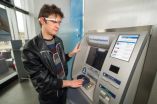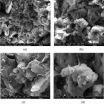(Press-News.org) This news release is available in German.
Taking photos with a wink, checking one's calendar with a glance of the right eye, reading text messages — the multinational cooperation Google wants to make it possible with Google Glass. But what IT experts celebrate as a new milestone makes privacy groups skeptical. So far, few people have access to the prototype to test how it can be used in daily life. "Thanks to the Max Planck Institute for Informatics we are one of the few universities in Germany that can do research with Google Glass", says Dominique Schröder, assistant professor of Cryptographic Algorithms at Saarland University.
The futuristic-looking device consists of a glasses frame on which a camera and a mini computer are installed. It depicts information in the user's field of vision via a glass prism that is installed at the front end of the right temple. According to the German computer magazine "c't", this causes an effect "as if the user were looking at a 24 inch screen from a distance of two and a half meters". Schröder, who also does research at the Center for IT-Security, Privacy and Accountability (CISPA), located only a few yards away, is aware of the data security concerns with Google Glass: "We know that you can use it to abuse data. But it can also be used to protect data." To prove this, Schröder and his group combine "Google Glass" with cryptographic methods and techniques from automated image analysis to create the software system "Ubic". By using Ubic, withdrawing money at a cash machine would change as follows: The customer identifies himself to the cash machine. This requests from a reliable instance the public key of the customer. It uses the key to encrypt the one-way personal identification number (PIN) and seals it additionally with a "digital signature", the digital counterpart of the conventional signature. The result shows up on the screen as a black-and-white pattern, a so-called QR code. The PIN that is hidden below is only visible for the identified wearer of the glasses. Google Glass decrypts it and shows it in the wearer's field of vision." Although the process occurs in public, nobody is able to spy on the PIN", explains Schröder. This is not the case if PINs are sent to a smart phone. To spy on the PIN while it is being entered would also be useless, since the PIN is re-generated each time the customer uses the cash machine. An attacker also wearing a Google Glass is not able to spy on the process, either. The digital signature guarantees that no assailant is able to intrude between the customer and the cash machine as during the so-called "skimming", where the assailant can impersonate the customer.
Only the customer is able to decrypt the encryption by the public key with his secret key. As long as this is safely stored on the Google Glass, his money is also safe. At the computer expo Cebit, the researchers will also present how Google Glass can be used to hide information. Several persons all wearing Google Glass can read the same document with encrypted text at the same time, but in their fields of vision they can only see the text passages that are intended for them.
"This could be interesting, for example, for large companies or agencies that are collecting information in one document, but do not want to show all parts to everybody", explains Mark Simkin, who was one of the developers of Ubic. A large electric company has already sent a request to the computer scientists in Saarbrücken. Google Glass is expected to enter the American market this year.
INFORMATION:
Background information about computer science research at Saarland University in Germany
The Department of Computer Science represents the center of computer science research in Saarbrücken. Seven other worldwide renowned research institutes are close by the department: The Max Planck Institutes for Informatics and for Software Systems, the German Research Center for Artificial Intelligence (DFKI), the Center for Bioinformatics, the Intel Visual Computing Institute, the Center for IT Security, Privacy and Accountability (CISPA) and the Cluster of Excellence "Multimodal Computing and Interaction".
More Information:
Project video: http://goo.gl/4mS0Jq
Further Questions:
Dominique Schroeder
Assistant Professor
Cryptographic Algorithms
Phone: +49 681 302-71922
Email: ds@ca.cs.uni-saarland.de
Mark Simkin
Cryptographic Algorithms
Email: simkin@ca.cs.uni-saarland.de
Editor:
Gordon Bolduan
Science Communication
Competence Center of Informatics
Phone: +49 (0)681 302-70741
Email: bolduan@mmci.uni-saarland.de
IT security for the daily life: Withdrawing money at cash machines with 'Google Glass'
2014-03-06
ELSE PRESS RELEASES FROM THIS DATE:
Study: Classroom focus on social and emotional skills can lead to academic gains
2014-03-06
VIDEO:
This video shows: "Efficacy of the Responsive Classroom Approach:
Results from a Three Year, Longitudinal Randomized Controlled Trial. "
Published Online First in:
American Educational Research Journal
March 6, 2014
Authors:
Sarah Rimm-Kaufman, Ross A. Larsen, Alison...
Click here for more information.
WASHINGTON, D.C., March 6, 2014 ─ Classroom programs designed to improve elementary school students' social and emotional skills can also ...
Dr. Dwight Rouse addresses rapid increase in cesarean birth rates
2014-03-06
In 2011, one in three pregnant women in the U.S. delivered babies by cesarean delivery. While cesarean delivery may be life-saving for the mother, the baby or both, the rapid increase in cesarean birth rates since 1996 without clear indication raises concerns that this type of delivery may be overused.
Dwight J. Rouse, MD, MSPH, a specialist in the Division of Maternal-Fetal Medicine at Women & Infants Hospital of Rhode Island and a professor of obstetrics and gynecology at The Warren Alpert Medical School of Brown University, has co-authored the first in a new, joint ...
Tiger mothers run risk of raising ethnic outcasts in pursuit of academic success
2014-03-06
For Chinese and Vietnamese immigrant parents and their children, success is equal to getting straight As, graduating from an elite university and pursuing an advanced degree. However, these narrow measures of success can make those who do not fulfil the strict aspirations feel like ethnic outliers, warn Jennifer Lee of UC Irvine in the US and Min Zhou of Nanyang Technological University in Singapore. Their findings are published in Springer's journal Race and Social Problems.
The researchers analyzed in-depth interviews of 82 adult children of Chinese and Vietnamese immigrants, ...
Genetic techniques have role in future of dental care
2014-03-06
A visit to the dentist could one day require a detailed look at how genes in a patient's body are being switched on or off, as well as examining their pearly whites, according to researchers at the University of Adelaide.
In a new paper published in the Australian Dental Journal, researchers from the University of Adelaide's School of Dentistry have written about the current and future use of the field of epigenetics as it relates to oral health.
Speaking on Dentist's Day (Thursday 6 March), co-author Associate Professor Toby Hughes says epigenetics has much to offer ...
Black boys viewed as older, less innocent than whites, research finds
2014-03-06
WASHINGTON – Black boys as young as 10 may not be viewed in the same light of childhood innocence as their white peers, but are instead more likely to be mistaken as older, be perceived as guilty and face police violence if accused of a crime, according to new research published by the American Psychological Association.
"Children in most societies are considered to be in a distinct group with characteristics such as innocence and the need for protection. Our research found that black boys can be seen as responsible for their actions at an age when white boys still benefit ...
Energy drinks linked to teen health risks
2014-03-06
The uplifting effects of energy drinks are well advertised, but a new report finds consumption among teenagers may be linked with poor mental health and substance use.
Researchers are calling for limits on teen's access to the drinks and reduction in the amount of the caffeine in each can.
The paper by researchers at the University of Waterloo and Dalhousie University, published in Preventive Medicine, found that high school students prone to depression as well as those who are smoke marijuana or drink alcohol are more likely to consume energy drinks than their peers.
...
Computational tool offers new insight into key biological processes
2014-03-06
Researchers from North Carolina State University have developed a computational tool designed to guide future research on biochemical pathways by identifying which components in a biological system are related to specific biochemical processes, including those processes responsible for gene expression, cell signaling, stress response, and metabolism.
"Our goal was to identify modules, or functional units, which are critical to the performance of the biochemical pathways that govern a host of biological processes," says Dr. Cranos Williams, an assistant professor of electrical ...
Why soil changes color in air
2014-03-06
According to the results of a recent study, soil color changes in the atmosphere basically through the oxidation of chemical substances in the soil. The fundamental mechanism is the remodeling effect of micro-structures because of motion effects and chemical reactions of the water–soil–electrolyte–atmosphere system leading to the coupling and transforming of soil particles. The above provides a theoretical foundation for the assessment and forecast of the stability of the geotechnical environment.
Nowadays, with increasing focus on the harmful effects of fog and haze ...
Eating red and processed meat -- what do scientists say
2014-03-06
Oxford, March 6, 2014 -- Recent reports warn about a link between eating red and processed meat and the risk of developing cancer in the gut. These reports have resulted in new nutritional recommendations that advise people to limit their intake of red and processed meats. A recent perspective paper, authored by 23 scientists, published in the latest issue of journal Meat Science underlines the uncertainties in the scientific evidence and points to further research needed to resolve these issues and improve the foundation for future recommendations on the intake of red ...
Waiting for a donor heart: Motion prolongs survival
2014-03-06
For many people with advanced cardiac insufficiency, a heart transplant may be their only hope. e. But waiting for a donor heart to come along is a race against time. Patients who remains active and stay in good shape psychologically can significantly increase their chances of surviving this period. . Anxiety-ridden, depressive and passive patients, on the other hand, run the risk of further serious deterioration of their heart's ability to function.
This is what health psychologists at the universities of Luxembourg, Mainz and San Francisco found in a study conducted ...


